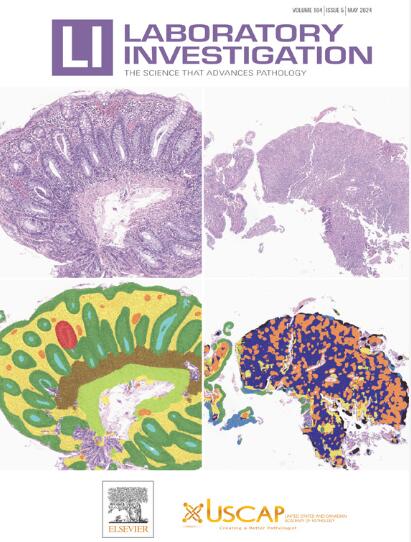Nup210通过调节核浆转运促进结直肠癌的进展。
IF 5.1
2区 医学
Q1 MEDICINE, RESEARCH & EXPERIMENTAL
引用次数: 0
摘要
核孔复合体(NPC)调节真核细胞中的核质运输、转录和基因组完整性。然而,人们对 NPC 在癌症中的作用知之甚少。本研究调查了核孔蛋白 210(Nucleoporin 210,Nup210)在结直肠癌(CRC)中的作用。生物信息学分析表明,Nup210在CRC中的表达增加,与患者的不良预后有关,但它并不是一个有统计学意义的独立预后因素。此外,在 CRC 细胞中敲除 Nup210 能抑制 CRC 细胞在体内和体外的增殖、侵袭和转移。此外,抑制 Nup210 表达后,CRC 细胞的核大小、核浆物质运输能力以及表面 NPC 的数量和密度都会下降。此外,Nup210需要核定位序列(NLS)才能定位到核膜表面并与导入素α/β相互作用,进而影响核浆物质的转运。进口蛋白小分子抑制剂 Importazole 与针对 Nup210 蛋白的疗法有望成为治疗 CRC 的新策略。它们的组合可能会更有效地降低 CRC 肿瘤负荷。总之,Nup210 通过 NLS 调节细胞核浆转运能力和细胞表面 NPC 密度,从而促进 CRC 的进展。这一发现验证了 NPC 在 CRC 发展过程中的分子功能,并为将 NPC 调控的核导入靶向作为 CRC 的治疗策略提供了理论基础。本文章由计算机程序翻译,如有差异,请以英文原文为准。
Nup210 Promotes Colorectal Cancer Progression by Regulating Nuclear Plasma Transport
The nuclear pore complex (NPC) regulates nucleoplasmic transport, transcription, and genomic integrity in eukaryotic cells. However, little is known about how NPC works in cancer. In this study, we investigated the role of the nuclear pore protein 210 (Nucleoporin 210, Nup210) in colorectal cancer (CRC). Bioinformatics analysis revealed that the expression of Nup210 was increased in CRC and was associated with poor patient prognosis, but it was not a statistically significant independent prognostic factor. Moreover, knockdown of Nup210 in CRC cells inhibited the proliferation, invasion, and metastasis of CRC cells in vivo and in vitro. Additionally, nuclear size and nuclear plasma material transport capacity decreased along with the number and density of NPCs on the surface of CRC cells when Nup210 expression was inhibited. Furthermore, Nup210 required nuclear localization sequences (NLS) to localize to the nuclear membrane surface and interact with importin-α/β, which in turn affected the transit of nuclear plasma material. Importazole, a small molecule inhibitor of importin, along with therapy that targets the Nup210 protein is anticipated to be a novel strategy for CRC treatment. Their combination may be able to more effectively lower CRC tumor load. In conclusion, Nup210 modulates cellular nucleoplasmic transport capability and cell surface NPC density via NLS, thus promoting CRC progression. This discovery validates the molecular function of NPC in the development of CRC and provides a theoretical foundation for NPC-regulated nuclear import targeting as a therapeutic strategy for CRC.
求助全文
通过发布文献求助,成功后即可免费获取论文全文。
去求助
来源期刊

Laboratory Investigation
医学-病理学
CiteScore
8.30
自引率
0.00%
发文量
125
审稿时长
2 months
期刊介绍:
Laboratory Investigation is an international journal owned by the United States and Canadian Academy of Pathology. Laboratory Investigation offers prompt publication of high-quality original research in all biomedical disciplines relating to the understanding of human disease and the application of new methods to the diagnosis of disease. Both human and experimental studies are welcome.
 求助内容:
求助内容: 应助结果提醒方式:
应助结果提醒方式:


